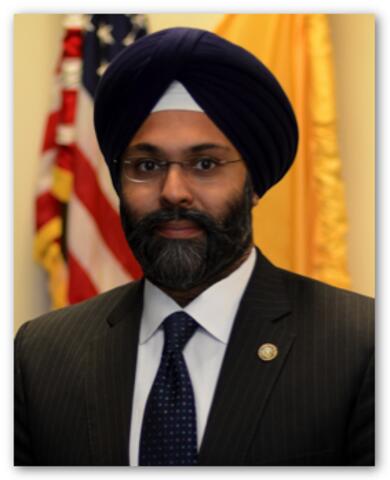Attorney General Gurbir S. Grewal last evening joined 19 other states in supporting a lawsuit alleging that the U.S. Customs and Border Protection has been unlawfully denying individuals access to asylum at ports of entry along the southern border.
The brief -- filed in U.S. District Court for the Southern District of California -- opposes the “Turnback Policy,” under which CBP agents have allegedly been seeking to prevent immigrants from applying for asylum. In the brief, the States explain that such practices unlawfully force asylum seekers to languish at the border under inhumane conditions.
“At a time when New Jersey has been building bridges with the immigrant community, the federal government has been doing everything it can to keep asylum seekers out,” said Attorney General Grewal. “It’s not only the border wall: the Administration has been denying immigrants access to asylum at the southern border, even at established ports of entry. America is at its best when we welcome refugees, not when we turn them away. The Administration’s Turnback Policy, which keeps asylum seekers out through misrepresentation and intimidation, is wrong and it is illegal.”
The lawsuit the states are supporting alleges that CBP agents’ tactics have included misrepresentations, threats and intimidation, coercion, abuse, and even “metering” -- the practice of putting artificial, daily limits on the number of asylum-seekers allowed to cross the border. The lawsuit alleges that agents have been rejecting asylum-seekers at ports of entry by telling them that there is no more capacity to handle them, that the United States no longer offers asylum, and/or that their children will be taken away unless they abandon their quest.
New Jersey consistently receives a high percentage of asylees. More than 3,000 people now living in New Jersey were granted asylum between 2012 and 2016, and the state ranks behind only California, New York and Florida in terms of the percentage of all asylum grantees it receives.
The multistate brief notes that the vast majority of refugees turned away are from one of the most violent regions in the world -- the so-called “Northern Triangle” countries in Central America. Their traumas -- including those experienced on their journey to the United States -- are exacerbated by their treatment under the Turnback Policy.
“The images and stories are grim,” the brief explains. “Children languishing at the border are becoming ill and not attending school, and families are not receiving basic health and social services that the States would otherwise provide, including mental health treatment.” Similarly, family members residing in the United States “suffer the anguish of uncertainty as their asylum-seeking relatives are in limbo at the border.”
This filing builds on Attorney General Grewal’s existing efforts to protect the rights of asylum seekers and immigrants. Other actions have included:
Filing a lawsuit on Monday challenging President Trump’s emergency declaration. The 16 states involved are challenging the President’s efforts to annex billions of federal dollars earmarked for military construction projects and law enforcement drug interdiction efforts and instead use the money for the purposes of building a wall along the southern border.
Filing a lawsuit this summer that challenged the federal government’s border enforcement policies, including its “cruel and unlawful” practice of forcibly separating families. (President Trump ultimately signed an Executive Order to formally end the family separation policy.)
Intervening in a federal court case in Texas to protect the federal Deferred Action for Childhood Arrivals (DACA) program, and successfully defeating Texas’s preliminary injunction motion in August 2018 -- which ensures that “Dreamers” can continue participating in the DACA program at this time.
Joining multiple other briefs opposing the federal government’s efforts to cut back on asylum, including in support of individuals fleeing domestic violence and individuals fleeing violent persecution by gangs in their home countries.
